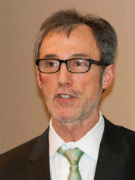New Jersey Future Blog
New Jersey Future Staff To Speak at Planning Conference
January 19th, 2017 by Elaine Clisham
Three members of the New Jersey Future staff will be on the dais at the New Jersey Chapter of the American Planning Association’s annual New Jersey Planning Conference, Jan. 26 and 27 in New Brunswick.
 Planning Manager David Kutner PP AICP will speak on a panel titled Reshaping Coastal Development. The session will review the New Jersey Department of Environmental Protection’s efforts to develop a planning process that uses future risk and vulnerability as the defining principles for coastal protection regulations. The session examine how flood-risk assessments are being conducted, and how suitability for development and redevelopment is being re-evaluated, in coastal areas. Presenters will also review alternative scenarios, designed to shift development away from areas at risk, that have been presented to three pilot communities – Little Egg Harbor Township, Tuckerton Borough and Toms River Township – and describe the communities’ response to them. The NJDEP will use the outcomes of these pilot projects to shape future risk-based coastal planning.
Planning Manager David Kutner PP AICP will speak on a panel titled Reshaping Coastal Development. The session will review the New Jersey Department of Environmental Protection’s efforts to develop a planning process that uses future risk and vulnerability as the defining principles for coastal protection regulations. The session examine how flood-risk assessments are being conducted, and how suitability for development and redevelopment is being re-evaluated, in coastal areas. Presenters will also review alternative scenarios, designed to shift development away from areas at risk, that have been presented to three pilot communities – Little Egg Harbor Township, Tuckerton Borough and Toms River Township – and describe the communities’ response to them. The NJDEP will use the outcomes of these pilot projects to shape future risk-based coastal planning.
 Green Infrastructure Manager Louise Wilson will present her project’s work in a session titled Mainstreaming Green Infrastructure: A Team Approach in Newton. The session will tell the story of Newton’s commitment and team approach to mainstreaming green infrastructure. Newton’s mayor, town manager and professional staff will talk about the town’s economic, social and water-related goals and interests; review efforts already under way; highlight related master plan language and ordinances; and share lessons learned in the process.
Green Infrastructure Manager Louise Wilson will present her project’s work in a session titled Mainstreaming Green Infrastructure: A Team Approach in Newton. The session will tell the story of Newton’s commitment and team approach to mainstreaming green infrastructure. Newton’s mayor, town manager and professional staff will talk about the town’s economic, social and water-related goals and interests; review efforts already under way; highlight related master plan language and ordinances; and share lessons learned in the process.
 Jersey Water Works Program Manager Jane Rosenblatt will be part of a panel titled Getting the Lead Out of Drinking Water: Do Planners Have a Role? The panel will emphasize that while engineers play the dominant role in infrastructure planning, planners should not shy away from their own critical role. Using the crisis of lead in drinking water as an example, this session will provide professional planners with the scientific and policy background on the issue; cover the role of data and partnerships; and discuss ways planners can assist communities and utilities in responding to water infrastructure challenges.
Jersey Water Works Program Manager Jane Rosenblatt will be part of a panel titled Getting the Lead Out of Drinking Water: Do Planners Have a Role? The panel will emphasize that while engineers play the dominant role in infrastructure planning, planners should not shy away from their own critical role. Using the crisis of lead in drinking water as an example, this session will provide professional planners with the scientific and policy background on the issue; cover the role of data and partnerships; and discuss ways planners can assist communities and utilities in responding to water infrastructure challenges.
















